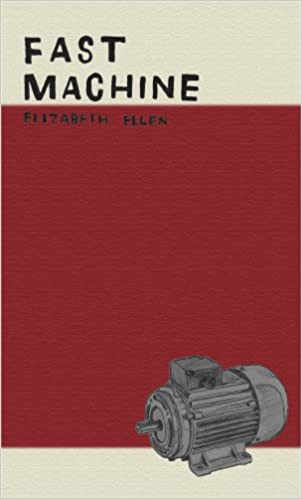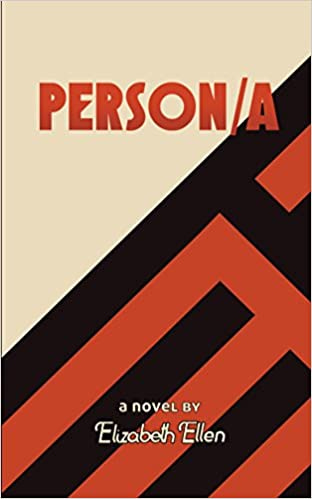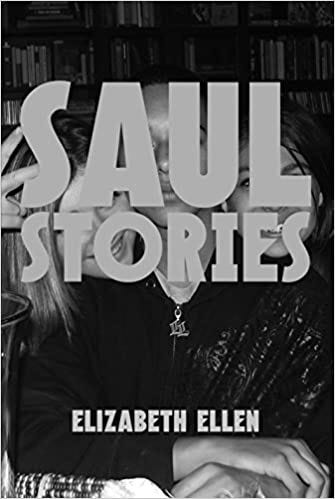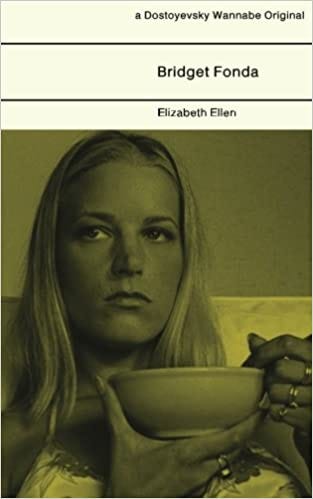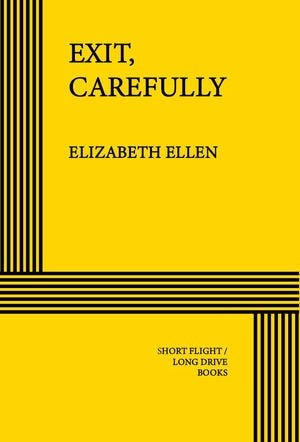Interview with Elizabeth Ellen - 2021
Interview #5 (short stories, autobiographical fiction, transgressive fiction, plays)
Elizabeth Ellen is the author of five books, most recently Her Lesser Work and Exit, Carefully. She is founder and editor of Short Flight/Long Drive Books. Her writing has been published in Joyland, FENCE, New York Tyrant, and Harper's Magazine.
Randal Eldon Greene: Hello, Elizabeth Ellen,
I would like to start off talking about your collection, Fast Machine. Now these stories are autofiction, are they not? There are so many repetitions of scenes, facts, and characters—each building into its own unique story—that it’s hard to read it without believing this is a collection of very personal stories.
Elizabeth Ellen: Hi, Randal!
I would say I am suspicious of the term autofiction, specifically as it is applied to writing by women. I see many novels and stories authored by women referred to as autofiction while novels/stories written by men are referred to as "autobiographical fiction." To me, the difference implies a lack of artistry on the part of women; AUTOfiction implies jotting down words as they pop into your head without consideration of or for artistry. AUTOfiction brings to mind writing whimsically in one's diary. Vomiting on the page. Perhaps I am too sensitive re the meaning of words. At any rate, I did not know the term autofiction when writing the stories in Fast Machine. But, would one apply the term autofiction to Hemingway? Fitzgerald? Baldwin? It could be argued they are repetitious in themes, characters, "facts." What is a "fact" in fiction? Are not all stories personal? To the author? American Psycho, while perhaps not correlating to the 'facts' of the author's life (though in many ways it does), feels highly personal (to the author). And I have heard him, Bret Easton Ellis, say that Patrick Bateman was, in part, him. So I think as readers we need to be mindful and careful in making any assumptions regarding the author's life. Also, they are usually just irrelevant. Whether something is real or a 'fact' or not—in my mind—is irrelevant. The only relevant thing being: is this interesting to read? Am I holding your interest, as a reader? Of course, one of the great joys of reading is trying to unfold the mystery, to separate and join the reality of the author with the fantasy of his/her work. If there is no mystery, there, there is no interest. All of which is a way to circle back to your question of autofiction and my coy response: I don't know, what do you think?
Randal Eldon Greene: I didn't realize the two terms weren't referring to the same thing (autofiction, I assumed was a shortened and easier-to-type version of autobiographical fiction). I think that some writers do draw heavily on their own lives to create narratives. Other writers use their own lives in less subtle ways, taking their experiences into account without using the actual stories of their lives. To me, the closer a story is to actual events in one's life, the closer it is to autobiographical fiction (I'm typing the non-short word, since it's evidently more accurate to what I'm referring to). Look Homeward Angel is a good example of what I consider autobiographical fiction, where an author mines one's life stories for their book. An even better example is Tim O'Brien's The Things They Carried. Your collection reminds me of his wonderful book in its form, especially its character building with repetition throughout the stories.
But to answer your coy question: I don't particularly care either way. In fact, I hate it when a selling point of a book or movie is 'based on true story.' Does that make the story better? Of course it doesn't. A good story is a good story. The reason I ask you if Fast Machine is autobiographical fiction is that I am curious about the way these pieces stand alone, yet begin to build a character that extends from story to story. The character shares your name and (I'm supposing) certain life events. And if this character isn't based on you, I've got to know your secret for bringing her to life in this fascinating, multi-story way, without letting any particular story (no matter how few words) appear sleight or non-substantial. And if she is based on you, I'm wondering about your process for choosing snippets of your life to fictionalize and how you so effectively bring them to life despite their abstracted nature.
Elizabeth Ellen:
And if she is based on you, I'm wondering about your process for choosing snippets of your life to fictionalize and how you so effectively bring them to life despite their abstracted nature.
Thank you. I don't know . . . I think, honestly, you probably start to 'think like a writer,' to view interactions/events 'as a writer,' for better or worse. For instance, I knew the day 'it' happened, I would write the story that became "Lucky Woman" that is running in Harper's next month (and in my new collection Her Lesser Work). I even joked with the person I was with at the time, the person who experienced the event with me, "Are you going to write about this or am I?" but I also knew, instinctively, thirty years earlier, even as I wasn't yet a 'writer', I would write one day a play about a Xmas Eve I was a part of then. And I finally did (Exit, Carefully, published by SF/LD Books this April).
I’ve even had interactions with other people in recent years in which I was asked (told): "You're not going to write about this, right?" and usually in that moment I believe I won't. But then trust is betrayed on both sides and it seems easier (less morally fraught) to write about (it/them).
I don’t know, I used to HATE reading about Arthur Miller and the Catch-22 guy (Heller?) writing about their families/women . . . I thought that was morally reprehensible.
Now I just see it as almost unavoidably part of them. Then writers get into discussions about how well you 'disguise' the other people in your work. Like, if you disguise them 'well enough,' you can still be morally okay. An okay human being. But if you don't disguise them well enough, you're a monster.
Usually the person thinks everyone will know it's them, and 9/10 when I’ve asked casual readers, they have no clue who the character was based on.
I try, personally, not to look at the world in terms of morality, good and bad, because I think we can always make a case for other people being immoral while ignoring our own immorality, so what's the point?
I try to find what's interesting about 'real life' and add other interesting aspects to it in fiction.
Often I even forget what's real and what I made up.
Or I’ll think of a person as their 'character name' first. Before I remember their 'real name.'
Does this make me a psychopath?
Maybe.
What’s a psychopath?
What’s morality?
What’s fiction?
And just because you perfectly disguise a person so that no one else will ever know (who the character in your novel is based on) does not mean you still aren't hurting the person (who knows it's about him/her).
You can't make art, I guess, without hurting other people/yourself.
Wait. What was your question? :)
Randal Eldon Greene: The moral barometer these days almost demands that writers approach their work conscientiously. Where does the needle fall for you when it comes to writing with care and nuance versus a dedication to the Truth of the story being told, the story you want to tell?
But, yes, it can be scary – terrifying - once the time comes to let the world see your art. Even if, especially if (?) the entire time you were making it you were like, FUCK YOU (middle finger raised) to the world.
Elizabeth Ellen: Hmmm. If you're asking me about a writer being judged based on her characters' actions/feelings/morals . . . is that what you're asking? Like, I just read an essay in TNYTBR that heavily suggested Nabokov must have been a pedophile deep down even if he never acted on it or how else could he have written Lolita (?)! But what then do we make of, say, Stephen King?! Here is how I write: without a care in the world as to what anyone will think, not even so much 'fearlessly' as completely in denial I could ever care what anyone else thinks about anything . . . which is a great way to write. I think. Liberating. 'Truthful' whatever that means. Then, and this is what is kind of happening right now/last night and today: I have a moment where I freak out, realizing things could be taken in a way I didn't intend them or out of context and I could be labeled again a monster of some sort or other. I just had to have two friends talk me down off this ledge today and remind me that our books/characters/writing are NOT US. That writing is a way to explore ideas we DON'T act on. Feelings we don't act on. Writing/books are a way to challenge societal norms, push boundaries. They are SUPPOSED to make people uncomfortable. They are intended to make people raise questions, consider ideas they may not have otherwise considered. See different viewpoints than their own. But, yes, it can be scary – terrifying - once the time comes to let the world see your art. Even if, especially if (?) the entire time you were making it you were like, FUCK YOU (middle finger raised) to the world.
Randal Eldon Greene: That is one very real example of what I'm talking about. Even with one of my earliest published works—a story published online by NPR—they had open comments, and somebody wrote that The Author must not like hippies simply because the narrator said something negative about them. This wasn't even an I-narrator.
I guess the other way I mean the question is more like an assessment of Camus's quote, "The purpose of a writer is to keep civilization from destroying itself." I think I fundamentally disagree with Camus, unless he means that the purpose of a writer is to keep civilization uncomfortable by poking it like the grumpy bear it is.
Your work certainly pushes people and can challenge them. That's one of the things I admire about your writing. I'm also curious about how you push yourself—push yourself to put a spin on everything as you approach each new project.
Elizabeth Ellen: Thank you! First, the Camus quote. I adore Camus. Have never read that quote. But I think it's impossible for a writer to keep civilization from anything. Certainly destroying itself. We never seem to learn anything (until maybe twenty years out). I would point to "The Lottery" and "The Crucible" and 'cancel culture' as ways we haven't learned a thing. I think we only 'learn' re 'others.' We can point to others in regard to the lessons of "The Lottery," but we can't see when we ourselves are throwing stones. Or burning witches. We justify the stones/burnings when we ourself throw/burn them.
In answer to your question, however, I don't know. I don't have any conscious thought about pushing myself. In any direction or away from any direction. I think I’m just naturally a contrarian. As well as someone who likes to ask questions to the point of exhausting everyone around me (and sometimes myself). I’ve noticed every year the interest in grey area discussions or in debate of any kind has waned to the point of—during the pandemic—the vast majority of people I know were uncomfortable, or seemed to be so, with any questions at all or any thinking other than extreme black and white, one side or the other opinions. I think this has dulled the arts, books, etc. People are terrified of being misquoted, misunderstood, taken out of context. Luckily, I was one of the first to be 'cancelled,' so that sort of liberated me. I don't have anything more to lose, career wise. When there's nothing more 'they' can take from you, you can speak freely.
Randal Eldon Greene: You're referencing your "Open Letter to the Internet," a personal essay that made you quite infamous. I believe I read it back when it was up on Hobart.
While having nothing more to lose professionally is a silver lining for sure and maybe a spiritual balm for the perpetual anxiety about being real/fake and loved/hated on social media, it had to have cost you a lot. I was just reading in Infinite Jest how this character in Alcoholics Anonymous reflects that the freedom he's earned came at the price of pain. It seems to me that freedom is often the opposite of a windfall, a lottery ticket or easy love, but costly, whether one actively seeks such freedom or unintentionally walks into the Temple of Ordeal without a magic flute.
What was it like going through being cancelled? What was the cost and how do you use your own freedom and experience to help others?
Elizabeth Ellen: Oh, . . . I still feel a bit of a knife to the throat with direct mention of the essay . . . it was horrible. Truly horrible. I lost friends. 'Friends.' Acquaintances. Peers. It had a definite (negative) effect on my marriage (at the time). I couldn't get published. No one asked me to be in anthologies or for blurbs or interviews anymore. It was like my career was finally 'taking off' and then suddenly: I was invisible. An outcast/cast out. For seven years. To be completely honest, if I hadn't had access to Hobart (for publishing myself, interviews with other authors, promoting the books I continued to publish)—which I’ve worked on and helped finance with my (now) ex-husband for almost twenty years (and wrote into our divorce papers - my continued access to it)—I don't know how I would have maintained any sense of . . . visibility at all. The worst part, though, I think, was being misrepresented. I think the number of people who read the essay is probably very small and the number who read it all the way through even smaller. I think probably most people have just heard of the essay and have heard a phrase or two about me/it, and judgment of me is based off that.
All for asking questions! It feels, honestly, very cultlike. Cancellation. If asking questions is punishable by being cast out, what else is this community but a cult?
(For the record, I asked three prominent women writers to have a round table conversation with me concerning the 'grey areas' of my essay and none would agree to talk about those issues or with me, which I think is also rather telling, rather cultlike behavior. I suppose they feared having open, honest dialogue about these issues also. I mean, who needs it? Why invite it?)
So yes. Freedom has a definite cost. Which is likely why most people don't want it. Or seek it out.
How do I use my experience to help others? Hmmm. Well, obviously I am very . . . empathetic to anyone going through the same (feeling misrepresented and bullied for something they've said/written). I’m not sure, other than by being an example of survival. An example of not allowing a crowd to bully you into submission, to put words in your mouth or on your paper. My mother always told me (based on some famous quote, I’m sure, though I don't know by who), "Just because you're the one person in a crowd saying something in opposition, doesn't mean you're wrong." I think it's important to have opposing voices. Opposing viewpoints. To debate. To argue. To write/publish what is referred to as transgressive fiction. I lean toward the transgressive in what/who I read/publish. Maybe offering them a voice. A platform. In answer to your question. Publishing people/books that might make others uncomfortable. That larger presses aren't interested in. For a variety of reasons.
Randal Eldon Greene: The conflux of internet culture, polarization, and a naïve kind of wokeness I feel is the etiology of what we've termed 'cancel culture. ' I'd say it's publishers and writers like yourself (not to mention the readers seeking out these works) who act as a kind of dam against the current. What would you say makes a good transgressive book? For that matter—at least through the lens of a publisher—what makes a bad transgressive book?
Elizabeth Ellen: Hmmm not sure how to answer this. I would say many books I have or will publish - Saul Stories, Nudes (Elle Nash), Women (Chloe Caldwell), Big World (Mary Miller), etc. Madonna (in the 90s), Robert Mapplethorpe, Basquiat, . . . I mean, anyone making people uncomfortable. Questioning norms/boundaries. Bret Easton Ellis. Ottessa Moshfegh. Kiese Laymon. Nico Walker. A 'bad' transgressive book? I honestly can't think of one. Probably because it failed to be transgressive? LOL or I failed to view it as such?
Randal Eldon Greene: Well, I've read what I consider bad transgressive fiction here and there. Not whole books (though I'm sure they exist), but short stories. I would say a bad transgressive book is one that simply makes you cringe, is full of stereotypes, and comes from a place of inauthenticity, lacking any depth and providing only shocks. Would you agree that shocking, but overwhelmingly cringey, is a possible candidate for bad transgressive fiction?
Elizabeth Ellen: I would just say that's not transgressive fiction. :)
Randal Eldon Greene: I wanted to ask you about your play Exit Carefully, which I was fortunate enough to have had a chance to read before publication. The play takes place on Christmas Eve in a small apartment in Reynoldsburg, Ohio. There are four characters. Beth, a nineteen year old woman back in town for the holiday. Linda, Beth's mother. Gary, Linda's boyfriend with whom she shares the apartment. And Beth's maternal grandmother, Gigi. Readers familiar with your oeuvre will recognize some of the themes and stories about the past that the characters tell during the play. What I found most interesting were the soliloquies that each character gave. How important was it for you to make sure each character had a chance to reveal themselves this way without the interruptions and emotional politics of the other characters?
Elizabeth Ellen: Well, I stole that idea - the soliloquies - from Kenneth Lonergan's play The Waverly Gallery, and, to a lesser extent, Tennessee Williams' The Glass Menagerie, in which Tom speaks directly to the audience. I saw The Waverly Gallery on Broadway three years ago and was very moved by Lucas Hedges' performance (as Daniel), particularly when he stepped to the front of the stage and spoke directly to us. I think it was after that I decided each character in Exit, Carefully should have a similar chance to speak for him/herself. I felt that was the most assured way for me to try to get not just my perspectives of each of them but their own of themselves represented fairly to the 'audience.' I tried to step away for those pages and just let them speak. So in answer to your question: very important. No one—or almost no one—views herself so simplistically as 'the bad guy.' But we often represent characters as though they are very incomplex bad guys. Or incomplex good guys. Neither of which was my goal. Either of which was something I fought against. In writing this play.
Randal Eldon Greene: Your characters actually remind me of Eugene O'Neill's group of alcoholics in The Iceman Cometh, especially in how they justify their behaviors and self-identify. Gigi's repeated excuse for excessive drinking is that it's "Christmas Eve, after all, and it's been a hard year." Linda might admit that she wasn't always the best mother, but, she repeats, that at least she had a good time. Beth's complaint isn't codified into a catchphrase, but could perhaps be described as a shitload of 'bad parenting. ' She is stuck with reliving the past and uses her trauma to justify her own violent outbursts and her failure at college. On the surface, I admit I'd be drinking with Gigi on Christmas Eve after losing my spouse. As a future parent I think I'm certainly still allowed to have a good time. And if I'd gone through what Beth went through, I think I would tie the worst of my behaviors to my childhood. But are any of these women really justified in the end?
Elizabeth Ellen: Are the women justified? Justified in what? Drinking? Having moral/character flaws? I guess the question is, are any of us ever justified re our character flaws? Do we need to be? Is being human not justification enough? I think ultimately death comes for us all, and it simply won't matter how good or bad of a person we've been. When we view squirrels, for instance, it's impossible for us, just by looking at them, to know which is being 'good' and which is being 'bad.' Even if we did take hours/days/months to study them, we just would never interpret their behavior in such terms. Squirrels are born, reproduce, die. Humans are no different, really. I know that's a bummer for people. That in the end our 'morality' doesn't matter to the universe. But that's also liberating. Cleansing. Forgiving. To think about. So the question of justification is irrelevant. In the bigger picture. On a day to day basis, of course we mostly strive to be 'good.' Or whatever fits into our current daily existence as good. Mostly morality is entertainment. Gossip. A way to pass the time before we die. Something to do. These women are passing the time. Entertaining themselves and one another. Just like the rest of us.
Randal Eldon Greene: That's a beautifully stated answer. Are there any plans in the works to get this staged? I would love to see a performance in person someday.
Elizabeth Ellen: I wish! I have no contacts in the theater world and haven't attempted to make any as of now . . .
Randal Eldon Greene: Well, hopefully someone smart in the industry picks up a copy and simply must get it performed in their theater.
I really appreciate your taking the time to chat with me, Elizabeth. It's been a pleasure.
Elizabeth Ellen: Thanks so much, Randal!
Find more of Elizabeth Ellen’s books on Amazon.
© 2021
About the interviewer:
Randal Eldon Greene is the author of Descriptions of Heaven, a novella about a linguist, a lake monster, and the looming shadow of death. His typos are tweeted @AuthorGreene and his website is AuthorGreene.com





